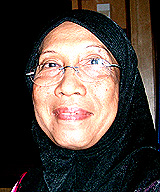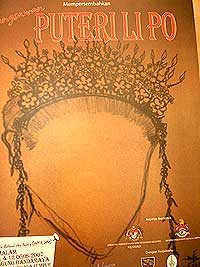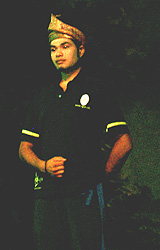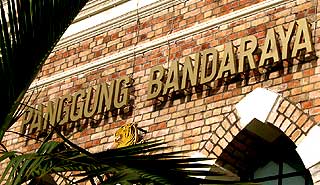ASK the youths on the street about bangsawan, and you'd probably be met with confusion and a shrug. There is a distinct sense among Malaysians that our cultural heritage is being swamped by globalisation and the electronic media.
 However, this form of traditional theatre is enjoying a recent spurt of rejuvenation as students take to the stage, thanks to their keen teachers who refuse to let the tradition go.
However, this form of traditional theatre is enjoying a recent spurt of rejuvenation as students take to the stage, thanks to their keen teachers who refuse to let the tradition go.
At the Panggung Bandaraya in Kuala Lumpur, I met up with Prof Rahmah Bujang ( right ), Head of Malay Studies at Universiti Malaya. The small, intimate theatre was busy with students rushing to prepare for their performance of Bangsawan Li Po , written and directed by the professor.
"This is the fourth production of Li Po , but I still enjoy staging it. Every time, there are different people involved, and new ideas get put into it. It's an evolutionary process," said Rahmah.
About Bangsawan
Bangsawan, also called Malay Opera, originated in Penang during the end of the 19th century. The first form of urban Malay theatre, it reached its height in the 1920's and 30's, but following World War II faced a decline in its popularity.
Singing, dancing and acting all feature in bangsawan. Plots combine elements of melodrama and comedy to portray tales of mythological and historical origin, with actors playing an almost improvisatory role.
One of the key features of this traditional theatre is the use of live incidental music. The instruments used are often eclectic, with violins playing next to saxophones, accordians and seruling. The style usually conforms to the cultural origin of the story; for example, this production of Li Po will contain elements of Chinese music.
 The backdrop is usually a large, hand-painted tirai or curtain, with lighting used to create a variety of different tones on the canvas. Rahmah intends to experiment with the use of digital prints in future productions.
The backdrop is usually a large, hand-painted tirai or curtain, with lighting used to create a variety of different tones on the canvas. Rahmah intends to experiment with the use of digital prints in future productions.
An art for all people
"Back in the day, bangsawan was the most popular form of entertainment around. It wasn't just for Malays; all types of people enjoyed watching the outdoor performances," explains Rahmah.
Both Chinese and Indians have commented on how pleased they are that the art is being revived.
"I chose the story of Hang Li Po because I felt that the concept of cultural assimilation it addresses has contemporary relevance."
"People these days are too judgmental, too complacent. We need to experience other cultures; reach out not just to other races, but also to the different generations."
"It's the young people who have to keep our heritage alive. They won't listen to us unless we listen to them, and I think that practical experience is the best way to develop an understanding."
A sense of enthusiasm and excitement could clearly be felt among the students involved. Divided into technical, creative and administrative teams, they develop a well-rounded sense of bangsawan theatre and its production.
"It's great!" said Nurul, a student participating in the production. "Bangsawan is fun, especially now that we're actually working on it instead of just sitting in a lecture theatre."

Rahmah showed a strong bond with her students, and they regularly approached her to ask questions.
"I am like their nenek ," she said with a smile.
Keeping it alive
Bangsawan theatre has enjoyed a recent push by the Ministry of Culture, Arts and Heritage in conjunction with KL City Hall as a part of the Semarak project.
By providing institutions and individuals with funding and resources, the Semarak project aims to hold bangsawan productions every month, with the Panggung Bandaraya providing the focal point for heritage activities.
Institutions of higher learning have also contributed to the rediscovery of Malaysian art forms, introducing arts courses with traditional elements into their curriculum.
"I have about 30 students in my class each year and they all have a passion for what they are learning," said Rahmah.
 "Our cultural heritage is not disappearing! There are plenty of people working hard to ensure that it stays alive."
"Our cultural heritage is not disappearing! There are plenty of people working hard to ensure that it stays alive."
Today, there are no active professional bangsawan troupes in Malaysia. Instead, productions involve amateur groups or students.
Nevertheless, Rahmah hopes that this will change as people develop an awareness and an appreciation for this colourful form of theatre.
Bangsawan Li Po enjoyed a very supportive run over the weekend at Panggung Bandaraya.
HON YI WEN is an intern with Malaysiakini . Comments can reach Rentakini by emailing [email protected]

